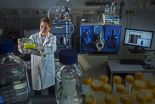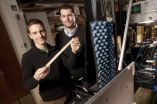(Press-News.org) This press release is available in German.
Toronto -- Early life exposure to normal bacteria of the GI tract (gut microbes) protects against autoimmune disease in mice, according to research published on-line in the January 17 edition of Science. The study may also have uncovered reasons why females are at greater risk of autoimmune diseases such as multiple sclerosis, rheumatoid arthritis, and lupus compared to males.
Researchers from The Hospital for Sick Children (SickKids) found that when female mice at high risk of autoimmune (type 1) diabetes were exposed to normal gut bacteria from adult male mice, they were strongly protected against the disease. In this type of mouse strain, more than 85% of females develop autoimmune diabetes due to strong genetic risk factors. In contrast, only 25% of the females developed the disease after they were given normal male gut microbes early in life.
"Our findings suggest potential strategies for using normal gut bacteria to block progression of insulin-dependent diabetes in kids who have high genetic risk," says principal investigator Dr. Jayne Danska. She is Senior Scientist in Genetics & Genome Biology at SickKids and Professor in the Departments of Immunology and Medical Biophysics at the University of Toronto.
A second unexpected finding was the effects of the gut microbe treatments on sex hormones. "We were surprised to see that when young female mice received normal gut microbes from adult males, their testosterone levels rose. We then showed that this hormone was essential for the gut microbe treatment to protect against the disease. It was completely unexpected to find that the sex of an animal determines aspects of their gut microbe composition, that these microbes affect sex hormone levels, and that the hormones in turn regulate an immune-mediated disease," says Dr. Danska.
She adds, "We don't know yet how transfer of male gut microbes into females increases their testosterone, or how this process protects against autoimmunity. This study opens up a new research arena to explore the clinical potential of altering the gut microbe community to prevent or treat immune-mediated diseases."
The hygiene hypothesis
The findings support the 'hygiene hypothesis,' which suggests that the dramatic increase in autoimmune and inflammatory diseases over the past 50 years results from changes in our exposure to microbes. Gut microbes are essential for normal development and training of the immune system, for extracting nutrients from our food, and for protecting us from some infectious diseases. "Our gut microbial community is an essential part of ourselves – bacterial cells outnumber human cells in our bodies by more than ten to one – and we live with them as partners," explains Dr. Danska.
Previous research has shown that children living on farms, exposed to a denser and more complex microbial environment, have fewer immune-mediated diseases compared to their village or urban-dwelling peers.
Today's publication is the first to identify a difference between normal gut microbes in males and females reared in identical conditions, and to show that transfer of male-sourced gut bacteria protects against autoimmune disease in females with high genetic risk.
"Our findings point to a direct relationship between normal gut microbe composition and prevention of autoimmune disease. From these discoveries we can move on to characterize the relationships between gut microbes, sex hormones, and ways to control unwanted immune responses," says Dr. Danska.
Implications for diabetes and other autoimmune diseases
The researchers' success in preventing type 1 diabetes from developing in high-risk mice suggests that similar approaches may be applicable in preventing and treating other immune diseases, particularly those showing a female sex bias, Dr. Danska says.
INFORMATION:
The paper is titled "Sex-specific differences in the gut microbiome drive testosterone-dependent protection from autoimmunity."
The paper's co-authors are from the University of Colorado Denver, the Helmholtz Centre in Leipzig, Germany, and the University of Bern in Switzerland. The study was funded by JDRF (Juvenile Diabetes Research Foundation), Canadian Institutes of Health Research, National institutes of Health (US), Genome Canada-Ontario Genomics Institute, and SickKids Foundation.
Publication:
Janet G. M. Markle, Daniel N. Frank, Steven Mortin-Toth, Charles E. Robertson, Leah M. Feazel, Ulrike Rolle-Kampczyk, Martin von Bergen, Kathy D. McCoy, Andrew J. Macpherson, Jayne S. Danska (2012): Sex Differences in the Gut Microbiome Drive Hormone-Dependent Regulation of Autoimmunity. SCIENCE, 17 January 2013, DOI: 10.1126/science.1233521
http://www.sciencemag.org/content/early/recent
For more information, please contact:
Polly Thompson
The Hospital for Sick Children
Toronto, Ontario, Canada
416-813-7654 ext. 2059
polly.thompson@sickkids.ca
Matet Nebres
The Hospital for Sick Children
Toronto, Ontario, Canada
416-813-6380
matet.nebres@sickkids.ca
Tilo Arnhold
Helmholtz Centre for Environmental Research (UFZ press office)
Leipzig, Germany
http://www.ufz.de/index.php?de=640
More Information:
Functional metaproteome of the microbiota
http://www.ufz.de/index.php?en=20158
About The Hospital for Sick Children
The Hospital for Sick Children (SickKids) is recognized as one of the world's foremost paediatric health-care institutions and is Canada's leading centre dedicated to advancing children's health through the integration of patient care, research and education. Founded in 1875 and affiliated with the University of Toronto, SickKids is one of Canada's most research-intensive hospitals and has generated discoveries that have helped children globally. Its mission is to provide the best in complex and specialized family-centred care; pioneer scientific and clinical advancements; share expertise; foster an academic environment that nurtures health-care professionals; and champion an accessible, comprehensive and sustainable child health system. SickKids is proud of its vision for Healthier Children. A Better World. For more information, please visit www.sickkids.ca.
About SickKids Centre for Research and Learning
The SickKids Centre for Research and Learning will bring together researchers from different scientific disciplines and a variety of clinical perspectives, to accelerate discoveries, new knowledge and their application to child health — a different concept from traditional research building designs. The facility will physically connect SickKids science, discovery and learning activities to its clinical operations. Designed by award-winning architects Diamond + Schmitt Inc. and HDR Inc. with a goal to achieve LEED® Gold Certification for sustainable design, the Centre will create an architectural landmark as the eastern gateway to Toronto's Discovery District. The SickKids Centre for Research and Learning is funded by a grant from the Canada Foundation for Innovation, the Government of Ontario, philanthropist Peter Gilgan and community support for the ongoing fundraising campaign. For more information, please visit www.sickkidsfoundation.com/bepartofit.
About the Helmholtz Centre for Environmental Research
At the Helmholtz Centre for Environmental Research (UFZ) scientists are researching the causes and consequences of far-reaching changes to the environment. They are concerned with water resources, biological diversity, the consequences of climate change and adaptability, environmental and biotechnologies, bioenergy, the behaviour of chemicals in the environment, their effect on health, modelling and social science issues. Their guiding theme: Our research contributes to the sustainable use of natural resources and helps to secure this basis for life over the long term under the effects of global change. The UFZ employs 1,000 people in Leipzig, Halle and Magdeburg. It is financed by the federal government and the federal states of Saxony and Saxony-Anhalt.
http://www.ufz.de/
The Helmholtz Association contributes towards solving major and pressing social, scientific and economic issues with scientific excellence in six research areas: Energy, Earth and Environment, Health, Key Technologies, Structure of Matter, Aeronautics, Aerospace and Transport. The Helmholtz Association is Germany's largest scientific organisation with over 33,000 employees in 18 research centres and an annual budget of approximately 3.4 billion euros. Its work stands in the tradition of the naturalist Hermann von Helmholtz (1821-1894).
http://www.helmholtz.de
GI tract bacteria may protect against autoimmune disease
Researchers show that altering gut microbes protects against disease, supporting the 'hygiene hypothesis'
2013-01-18
ELSE PRESS RELEASES FROM THIS DATE:
U Alberta researchers move Barkhausen Effect forward
2013-01-18
(Edmonton) Almost 100 years after the initial discovery, a team of scientists at the University of Alberta and the National Institute for Nanotechnology in Edmonton have harnessed the Barkhausen Effect as a new kind of high-resolution microscopy for the insides of magnetic materials.
The researchers say the technique has the potential to provide critical information as a rapid prototyper for magnetic computational devices that expand the role of magnetism within computers.
In 1919, Barkhausen discovered the first evidence of magnetic domains (patterns in how the directions ...
Doubling down on energy efficiency
2013-01-18
Spending on energy efficiency programs funded by electric and natural gas utility customers will double by 2025 to about $9.5 billion per year, according to projections published today by researchers at Lawrence Berkeley National Laboratory (Berkeley Lab).
These funds, which come from a charge on utility bills, historically constitute the nation's largest source of spending on programs to foster the adoption of more efficient products and buildings. According to the Berkeley Lab report, energy efficiency programs funded by utility customers are projected to continue ...
Novel sensor provides bigger picture
2013-01-18
DURHAM, N.C. – Duke University engineers have developed a novel sensor that is more efficient, versatile and cheaper for potential use in such applications as airport security scanners and collision avoidance systems for aircraft, cars or maritime vessels.
The researchers fabricated a unique material, known as a metamaterial, that acts as a lens to image scenes using fewer components than conventional detectors. Because of the properties of this man-made material, much of the additional equipment needed for conventional detector systems – like lenses, mechanical positioners ...
Irregular heart beat elevates risk of kidney failure
2013-01-18
Many people who suffer from chronic kidney disease progressively lose their kidney function over time and eventually develop a condition called end-stage renal disease – the complete failure of the kidneys – placing them in need of lifelong dialysis or a kidney transplant.
Now researchers at the University of California, San Francisco (UCSF) and the Kaiser Permanente Northern California Division of Research have found that the risk of kidney failure is greater for people with chronic kidney disease who also have atrial fibrillation, one of the most common forms of irregular ...
Power's punishing impact
2013-01-18
Often, employees are shocked by what they think is a supervisor's severe reaction to a subordinate's seemingly minor transgression. The supervisors who punish them seem to be so absolutely sure that they are doing the right thing—they have a clear sense of purpose and there are no arguments to sway them.
New research by Scott Wiltermuth, a USC Marshall School of Business assistant professor of management and organization, and co-author Francis Flynn of the Stanford Graduate School of Business, found that providing a sense of power to someone instills a black-and-white ...
Mayo Clinic researchers identify enzyme involved in deadly brain tumors
2013-01-18
ROCHESTER, Minn. -- One of the most common types of brain tumors in adults, glioblastoma multiforme, is one of the most devastating. Even with recent advances in surgery, radiation and chemotherapy, the aggressive and invasive tumors become resistant to treatment, and median survival of patients is only about 15 months. In a study published in Neuro-Oncology, researchers at Mayo Clinic identify an important association between the naturally occurring enzyme Kallikrein 6, also known as KLK6, and the malignant tumors.
"Our study of Kallikrein 6 showed that higher levels ...
Botox beats steroids for painful foot condition, plantar fasciitis
2013-01-18
Los Angeles, CA (January 17, 2013) - Plantar fasciitis is the most frequent cause of chronic heel pain, leaving many sufferers unable to put their best foot forward for months at a time. Now a Mexican study suggests that physicians should turn to Botox rather than steroids to offer patients the fastest road to recovery. The research appears in the journal Foot & Ankle International, published by SAGE.
Plantar fasciitis results when connective tissues on the sole of the foot, the plantar fascia, become painfully inflamed. Physicians may suggest various therapies for this ...
Questions about biosafety? Ask a biosafety expert
2013-01-18
WASHINGTON— The rapid decline in costs associated with many common laboratory techniques, such as DNA sequencing and synthesis, has led to their adoption by individuals outside of traditional university or industrial settings, giving rise to a rapidly growing Do-It-Yourself Biology (DIYbio) community.
DIYbio.org and the Synthetic Biology Project at the Woodrow Wilson Center this week are launching the "Ask a Biosafety Expert" service in order to provide this emerging DIYbio community with free and timely access to professional biosafety advice. The project comes amidst ...
Why wolves are forever wild, but dogs can be tamed
2013-01-18
AMHERST, Mass. – Dogs and wolves are genetically so similar, it's been difficult for biologists to understand why wolves remain fiercely wild, while dogs can gladly become "man's best friend." Now, doctoral research by evolutionary biologist Kathryn Lord at the University of Massachusetts Amherst suggests the different behaviors are related to the animals' earliest sensory experiences and the critical period of socialization. Details appear in the current issue of Ethology.
Until now, little was known about sensory development in wolf pups, and assumptions were usually ...
Health and law expert: NFL not alone in handling concussions as 'benign' problems
2013-01-18
INDIANAPOLIS -- More than 2,000 former football players are suing the National Football League, saying the league should have taken action earlier to deal with injuries related to concussions more seriously.
But if a lack of speed in tackling concussions warrants criticism, the NFL isn't the only player deserving a penalty, according to a study co-authored by health care and law expert David Orentlicher, who teaches at Indiana University Robert H. McKinney School of Law in Indianapolis.
Neurologists were also slow in sounding the alarm, and for decades, concussions ...
LAST 30 PRESS RELEASES:
National poll finds gaps in community preparedness for teen cardiac emergencies
One strategy to block both drug-resistant bacteria and influenza: new broad-spectrum infection prevention approach validated
Survey: 3 in 4 skip physical therapy homework, stunting progress
College students who spend hours on social media are more likely to be lonely – national US study
Evidence behind intermittent fasting for weight loss fails to match hype
How AI tools like DeepSeek are transforming emotional and mental health care of Chinese youth
Study finds link between sugary drinks and anxiety in young people
Scientists show how to predict world’s deadly scorpion hotspots
ASU researchers to lead AAAS panel on water insecurity in the United States
ASU professor Anne Stone to present at AAAS Conference in Phoenix on ancient origins of modern disease
Proposals for exploring viruses and skin as the next experimental quantum frontiers share US$30,000 science award
ASU researchers showcase scalable tech solutions for older adults living alone with cognitive decline at AAAS 2026
Scientists identify smooth regional trends in fruit fly survival strategies
Antipathy toward snakes? Your parents likely talked you into that at an early age
Sylvester Cancer Tip Sheet for Feb. 2026
Online exposure to medical misinformation concentrated among older adults
Telehealth improves access to genetic services for adult survivors of childhood cancers
Outdated mortality benchmarks risk missing early signs of famine and delay recognizing mass starvation
Newly discovered bacterium converts carbon dioxide into chemicals using electricity
Flipping and reversing mini-proteins could improve disease treatment
Scientists reveal major hidden source of atmospheric nitrogen pollution in fragile lake basin
Biochar emerges as a powerful tool for soil carbon neutrality and climate mitigation
Tiny cell messengers show big promise for safer protein and gene delivery
AMS releases statement regarding the decision to rescind EPA’s 2009 Endangerment Finding
Parents’ alcohol and drug use influences their children’s consumption, research shows
Modular assembly of chiral nitrogen-bridged rings achieved by palladium-catalyzed diastereoselective and enantioselective cascade cyclization reactions
Promoting civic engagement
AMS Science Preview: Hurricane slowdown, school snow days
Deforestation in the Amazon raises the surface temperature by 3 °C during the dry season
Model more accurately maps the impact of frost on corn crops
[Press-News.org] GI tract bacteria may protect against autoimmune diseaseResearchers show that altering gut microbes protects against disease, supporting the 'hygiene hypothesis'





